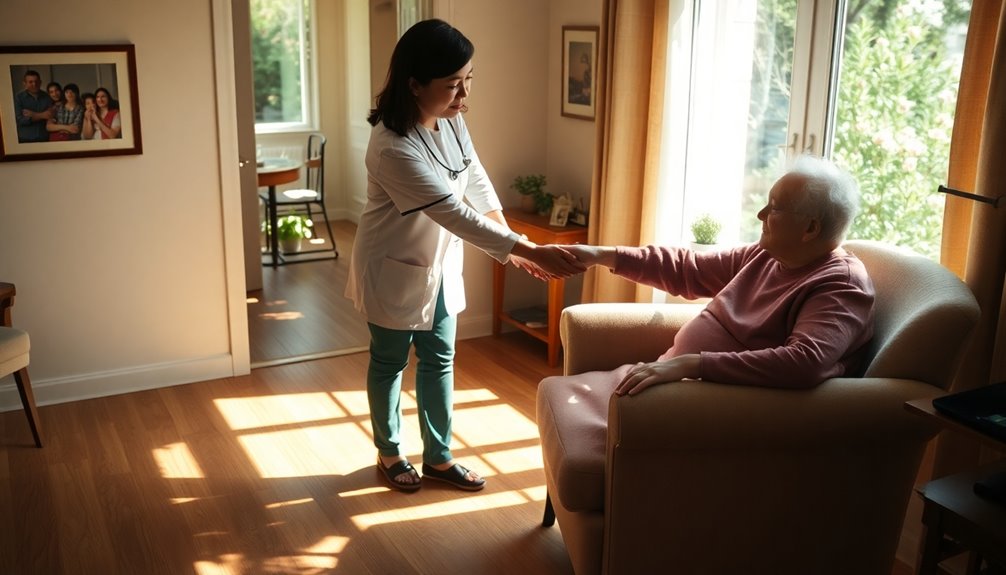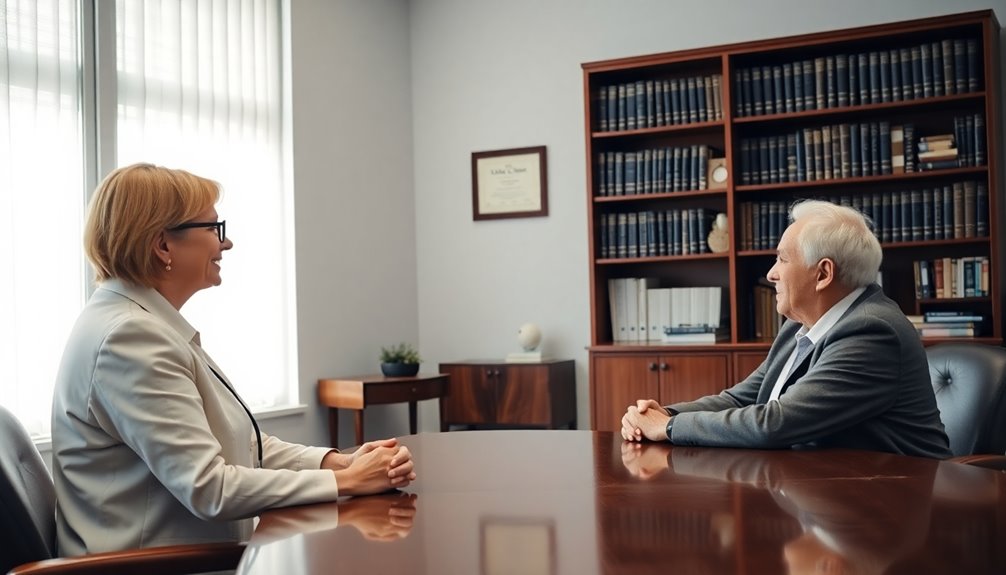Yes, a caregiver can be designated as a Power of Attorney (POA). This allows them to make important healthcare and financial decisions for the person they care for, even when that person becomes incapacitated. As a POA, the caregiver has fiduciary duties to prioritize the principal's needs, ensuring transparency and ethical conduct. It is crucial to understand the responsibilities and limitations associated with this role. Keep exploring to learn more about the nuances of being a caregiver as a POA.
Key Takeaways
- Yes, a caregiver can be designated as a Power of Attorney (POA) for healthcare or financial decision-making.
- Caregivers must prioritize the principal's needs and document their caregiving tasks accurately.
- A written and notarized POA document is required to validate the caregiver's authority.
- Caregivers must avoid conflicts of interest and maintain transparency with family members.
- Breaching fiduciary duties as a POA can lead to legal repercussions for caregivers.
Understanding Power of Attorney

When you consider the importance of having control over your healthcare and financial decisions, understanding Power of Attorney (POA) is essential.
A Durable Power of Attorney allows you to designate an Agent who can make decisions on your behalf, even if you become incapacitated. Both you and your Agent need to be at least 18 years old and of sound mind to create a valid POA.
It's important to recognize that there are different types of POA; while a Durable Power of Attorney takes effect immediately, a springing POA only activates when you're deemed incapable.
Typically, Healthcare and Financial Powers of Attorney are separate documents tailored to your specific needs, remaining valid until you revoke them or pass away.
The Role of Caregivers

Caregivers play an essential role in the lives of elderly individuals, often becoming their lifeline for daily support and decision-making. They manage important aspects of their clients' lives, enhancing their overall well-being.
When caregivers also serve as Power of Attorney, it streamlines communication and decision-making processes.
Here are some key responsibilities of caregivers:
- Assisting with daily activities like bathing and dressing
- Managing healthcare appointments and medications
- Providing emotional support and companionship
- Communicating with family members about care needs
- Making significant financial and medical decisions when designated as POA
Understanding the role of caregivers is imperative, as they help guarantee that the needs of elderly individuals are met, while also facing challenges in family dynamics and emotional strain.
Types of Power of Attorney

When considering Power of Attorney, you'll encounter two main types: Durable and Springing.
Each type serves different needs, whether it's for immediate authority or waiting until you're incapacitated.
Plus, you can specify whether it's for healthcare or financial decisions, making it essential to clearly outline the powers you grant.
Durable vs. Springing POA
Understanding the differences between Durable and Springing Power of Attorney (POA) is essential for making informed choices about who'll manage your affairs.
- Durable Powers of Attorney take effect immediately and remain valid even if you become incapacitated.
- Springing POAs activate only upon your incapacity, requiring a physician's declaration.
- Both types can cover healthcare or financial decisions but must be documented separately.
- A notary public needs to attest the POA to verify its validity.
- Choosing the right type aligns authority with your preferences and needs.
Healthcare vs. Financial POA
Power of Attorney (POA) comes in two primary forms: Healthcare POA and Financial POA, each serving distinct purposes.
A Healthcare POA allows your designated agent to make medical decisions on your behalf when you're unable to do so. This type often accompanies Advance Directives, ensuring your health care wishes are honored.
On the other hand, a Financial POA grants your agent the authority to manage your financial affairs, like paying bills or handling investments, especially during times of incapacity.
You can appoint different agents for each type of POA.
Designation and Authority Limits
Choosing a caregiver as your Power of Attorney (POA) involves clear designation and understanding of authority limits. You need to define what powers you're granting and guarantee your caregiver meets state-specific legal requirements.
Consider these key aspects:
- Types of POA: Durable allows immediate management; Springing activates upon incapacity.
- Authority Limits: Specify particular powers in the POA document.
- Fiduciary Duties: Caregivers must act in your best interest.
- Communication: Keep family members informed about the caregiver's role.
- Legal Compliance: Ensure your designation adheres to local laws.
Designation Process for Power of Attorney

When designating a caregiver as your Power of Attorney (POA), it's essential to confirm they meet the legal requirements of age and mental competence.
The designation process for power of attorney involves drafting a written document that clearly outlines the specific powers you're granting. You need to sign this document, and it typically requires notarization for validity.
This guarantees that your wishes are legally recognized and minimizes confusion about the caregiver's authority. If you have any concerns about the caregiver's capacity, court intervention may be necessary to protect your interests.
Having a caregiver as your POA can streamline decision-making, especially in urgent situations, since they're already familiar with your needs and preferences.
Caregiver Responsibilities and Limitations

Designating a caregiver as your Power of Attorney (POA) comes with specific responsibilities and limitations that are important to understand.
As a caregiver, you'll need to prioritize the best interests and wishes of the person you represent. Your caregiver responsibilities may include:
- Managing medical care decisions
- Handling financial matters
- Communicating effectively with healthcare providers
- Discussing care options with family members
- Documenting decisions to avoid misunderstandings
While these duties are essential, be mindful of potential conflicts of interest that might arise due to your dual role.
Clear communication about your responsibilities as POA can help define your role and prevent disputes, ensuring that you serve effectively without overstepping boundaries.
Conflicts of Interest in Caregiving and POA

Conflicts of interest often arise in caregiving situations, especially when you're acting as a Power of Attorney (POA).
When financial decisions come into play, you might find yourself prioritizing monetary concerns over the individual's care needs. This can create tension, particularly if family members disagree with your choices.
Disagreements may also emerge between you and healthcare POAs regarding treatment options, adding stress for everyone involved.
To navigate these conflicts of interest effectively, communication is key. Keeping family members informed and involved in decision-making can help align everyone's understanding of the individual's needs.
Transparency is essential, as trust issues can surface if your role in financial matters raises concerns among family members. Additionally, understanding filial responsibility laws can guide financial planning and help mitigate conflicts over support obligations.
Legal Considerations for Caregivers as POA

As a caregiver acting as Power of Attorney (POA), you have specific legal obligations to uphold, including fiduciary duties that prioritize your principal's needs.
You'll also need to keep careful documentation of your caregiving tasks to stay compliant and avoid disputes.
Clear communication is essential to manage potential conflicts of interest effectively, especially around financial and healthcare decisions.
Fiduciary Duty Obligations
When a caregiver takes on the role of Power of Attorney (POA), they accept a significant legal responsibility known as fiduciary duty. This duty requires you to prioritize the principal's best interests, ensuring their well-being and financial security.
To fulfill this obligation, you must:
- Avoid conflicts of interest
- Keep accurate records of all transactions
- Communicate regularly with family members
- Steer clear of self-dealing or misusing assets
- Act transparently to build trust
Neglecting your fiduciary duty can lead to legal consequences, including breach of trust and criminal charges.
Documentation Requirements
Upholding fiduciary duties is essential, but it's equally important to confirm that all documentation is in order when you're acting as Power of Attorney (POA). You must have the POA designation documented in writing, signed by the Principal and notarized for validity. This document should clearly outline your specific powers, whether financial, healthcare, or both.
| Documentation Type | Purpose |
|---|---|
| POA Document | Validates your authority |
| Record of Actions Taken | Demonstrates adherence to duties |
| Financial Transaction Records | Confirms transparency and compliance |
Many states provide universal forms, but always check that they meet your state's requirements. Accurate records protect you from disputes and government inquiries.
Potential Conflicts of Interest
Steering the role of caregiver while serving as Power of Attorney (POA) can lead to potential conflicts of interest, especially if decisions seem to benefit you financially over the principal's needs.
This dual role can create tension among family members regarding care and financial decisions. To minimize these conflicts, keep the following in mind:
- Prioritize the principal's best interests.
- Communicate openly with family about decisions.
- Document all financial decisions clearly.
- Establish guidelines for your responsibilities.
- Remain vigilant to avoid breaching fiduciary duties.
Additionally, understanding the best interests of the child standard in legal matters can help guide your decisions regarding the principal's welfare.
Communicating Needs and Expectations

How can clear communication shape the caregiver-principal relationship?
It's crucial for effective decision-making and minimizing misunderstandings about care and financial matters. By openly discussing your needs and expectations, you establish a foundation of trust and understanding.
As a caregiver with power of attorney, confirm the principal's wishes are documented to avoid conflicts. Regular discussions about your responsibilities can clarify roles and make maneuvering complex situations easier.
Engaging family members in these conversations also fosters a collaborative environment, alleviating concerns. Additionally, setting up formal agreements outlining your duties and expectations provides clarity and serves as a reference point for everyone involved.
This proactive approach strengthens the relationship and enhances the quality of care provided. Furthermore, understanding the connection between Parkinson's and dementia can help inform care strategies and decision-making processes.
Guardianship as an Alternative to POA

When a Power of Attorney (POA) isn't established, guardianship becomes a viable option for caregivers seeking legal authority to make decisions on behalf of someone who can't do so themselves.
The guardianship process involves petitioning the court to assess the individual's incapacity and appoint a guardian. This can be lengthy and complex, but it's essential for ensuring the person's needs are met.
- Courts usually grant guardianship if you show genuine commitment.
- Background checks are required for potential guardians.
- Competing claims may arise, especially with significant assets involved.
- Legal representation is advisable to navigate the process.
- Your goal should always be the individual's best interests.
Understanding guardianship helps you make informed decisions in caregiving situations.
Seeking Legal Assistance in Elder Care Matters

Steering elder care matters can feel overwhelming, especially when it comes to legal issues like establishing a Power of Attorney (POA).
Seeking help from an Elder Law Attorney can simplify this process. They can guide you through the legal requirements for designating a caregiver as POA, ensuring you comply with state laws.
An attorney's expertise is essential for drafting a clear POA document that defines the caregiver's responsibilities and limitations. Consulting with legal counsel also helps address potential conflicts of interest or trust issues that may arise.
Frequently Asked Questions
Can a Power of Attorney Be a Caregiver?
Yes, a Power of Attorney (POA) can absolutely be a caregiver.
In fact, having the same person serve both roles can simplify decision-making and guarantee consistency in care.
When you designate someone as your POA, they can manage your financial and medical choices while also providing direct care.
Just make certain you communicate clearly about their responsibilities and avoid any potential conflicts of interest to ensure your best interests are always prioritized.
What Three Decisions Cannot Be Made by a Legal Power of Attorney?
A legal Power of Attorney can't make certain vital decisions.
First, it can't override the Principal's wishes as stated in advance directives, especially for end-of-life care.
Second, it can't engage in decisions involving marriage, divorce, or adoption, since those require personal consent.
Finally, it can't engage in self-dealing, meaning it can't benefit personally from the Principal's financial matters without clear authorization.
These limitations guarantee the Principal's autonomy and preferences are respected.
What Are the Caregivers Should Not Do?
As you navigate the complexities of caregiving, it's vital to remember what you shouldn't do.
Don't prioritize financial interests over your loved one's health needs. Avoid actions that contradict their wishes, as it can breach your duty.
Steer clear of financial transactions without clear documentation, and don't act beyond your authority.
Open communication with family is essential—don't let misunderstandings create mistrust.
Your role is to provide care, not to complicate relationships.
Who Is the Best Person for Power of Attorney?
When choosing the best person for Power of Attorney, think about trust and understanding.
You want someone who knows your values and can make informed decisions on your behalf. Family members like spouses or children often fit this role, but close friends can work too.
Make certain they're at least 18 and of sound mind.
Clear communication about your expectations is essential to guarantee their decisions reflect your wishes.
Conclusion
In summary, a caregiver can indeed serve as a power of attorney, enhancing their ability to advocate for your needs. It's important to know that nearly 70% of caregivers report feeling overwhelmed by their responsibilities. By clearly communicating your wishes and understanding the legal implications, you can guarantee your caregiver is prepared for this role. Remember, seeking legal assistance can help navigate the complexities of elder care, providing peace of mind for you and your loved ones.









